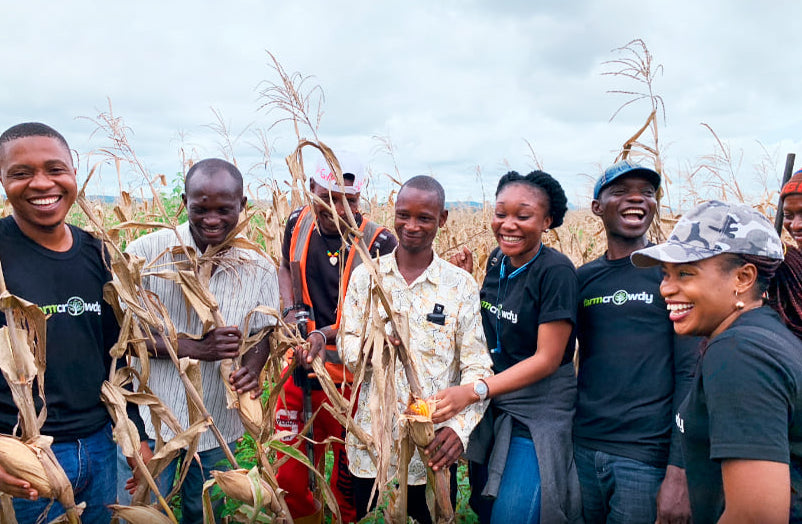ImpactAlpha, March 24 – Field drones. Harvesting robots. Big Data-driven farm insights. Innovative technological applications in agriculture can have a profound impact on farmers’ role in addressing food insecurity, climate change and livelihoods.
Upgrades in farm equipment lead to improved production scale and speed and efficient land cultivation. Remote sensing and connected devices help agricultural, horticultural, and aquacultural farmers measure productivity, seed and soil quality, disease risk and enable farmers to better able to optimize their output, reduce waste and anticipate negative issues.
Such global agriculture technologies are gathering pace quickly. The agtech sector is expected to have a compound annual growth rate of 18% between 2019 and 2025.
Unreasonable has the privilege of having an up-close view of the impact agtech companies are having on diverse markets and end consumers, through support for ventures like Canada-based Terramera, U.S.-based Aerofarms, India-based Dehaat and Em3 Agriservices – and a growing number of agtech ventures in Africa.
Unique market needs
While the U.S. leads the agtech market with innovation, investment capital and adoption rates. But Africa, which accounts for 60% of the world’s uncultivated arable land, is increasing its reliance on smart technologies and farming techniques.
The African farming experience is unique. Most of Africa’s farmers operate on a small-scale, and face persistent challenges including a lack of infrastructure, low access to competitive markets, and limited funding and investment support. These challenges open up an array of opportunities for investment in the region.
Large corporations such as Microsoft South Africa are calling on local IoT companies to identify technology-based solutions to Africa’s farming hurdles, such as how to increase farmer yields while reducing costs, how to protect natural resources around farms, and how to accelerate access to domestic and international markets. With increased access to information regarding crop quality and consistency, weather, pests, and soil, as well as access to local and international funding, farmers would be able to make better-informed produce and business decisions by implementing smart technologies and intelligence.
Nigeria: Farmcrowdy
The World Bank estimates that Africa’s crowd farming market will grow to $2.5 billion by the year 2025. By using IoT to connect smallholder farmers with investment across Africa, Farmcrowdy links land owners, farmers and investors with one another. The Nigerian start-up has raised over $15 million for 25 thousand smallholder clients since the company was founded in 2016.
In this multi-beneficial arrangement, Farmcrowdy sources funding from investors and allocates it to different farmers. The result is that investors receive healthy returns on their investments while farmers are connected with a consistent and reliable market through which to sell their produce, taking home 40% of the profits.
By closing the funding gap experienced across Africa, landowners are empowered to better use their resources and reinvest a portion of their profits into their businesses.
Ghana: AgroCenta
Ghanaian start-up AgroCenta is a sales platform that directly connects farmers to an online trading market to sell produce at a fair price. While small scale farmers used to have to sell their produce to middlemen for a third of its value, AgroCenta enables them to sell directly to customers, increasing their profits by over 25%.
Founded in 2016 by Michael Ocansey and Francis Obirikorang, their service offers additional access to a platform from which farmers can learn how to best store and protect their produce from disease, enabling them to scale their farming, maximize their outputs and increase their selling price.
South Africa: Aerobotics
Aerobotics is a South African AgriTech company that specializes in using high-resolution drone imagery and artificial intelligence (AI) to monitor crops. The technology identifies how best to manage farm risks, from problem identification to disease and pest management.
Aerobotic’s drones monitor the size, canopy area, and health conditions of specific trees, identifying any areas which require special attention and notifying the farmer. The end-to-end mobile app service offers access to an online agronomist, who can further help farmers identify and solve problems on the ground.
By giving commercial as well as smallholder farmers the tools to analyze their own farming processes, they are given autonomy to solve issues before they spread.
Cameroon: Prom-Agric
Prom-Agric is a mobile application that uses AI imagery to analyze and diagnose diseases found in crops. The company, founded in 2017 and led by Pyrrus Koudjou, hosts a database of information to help farmers diagnose their plant diseases and develop innovative solutions without paying for outside intervention.
The application also includes a live forum platform through which farmers can directly ask experienced agronomists about issues they might be facing with their crop health.
By reducing crop loss to disease, farmers are able to increase their productivity and outputs while ensuring the long-lasting health of their crops.
As the African population steadily increases, the continent expects to face many challenges around resource scarcity and food allocation. AgriTech solutions are an environmentally and socially beneficial investment opportunity with the potential to ignite sustainable economic growth and stability in the most job intensive industry in Africa.
Pratibha Vuppuluri is managing partner at Unreasonable Collective and head of global portfolio and investments at Unreasonable Group











